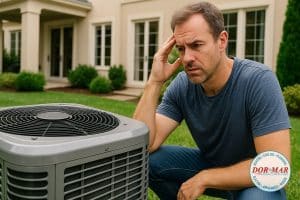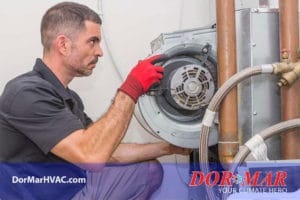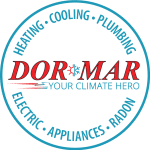Most people, when faced with the decision of being cool and comfortable during the extreme heat of Ohio summers, could care less whether they have a heat pump or an air conditioner. Most of us only care that our family is cool and comfortable. When it’s time to replace your home’s cooling equipment, it’s nice to know what options are available, and what’s best for your home.
Many homeowners may be confused when they try to figure the differences between the two devices, air conditioner or heat pump? This article should give you some solid clues to make the choice. In part 1, we examine Pros and Cons of Heat Pumps. In part 2, we’ll review air conditioner systems and then compare the two.
Heat Pump and Air Conditioner Basics
Heat pumps, during the cooling season, are designed to extract heat from your home and move it outdoors, and do the opposite during the winter. Air conditioners, on the other hand, can only perform half of those tasks: they only work to remove heat during the warmer summer months.
What is a Heat Pump?
In a nutshell, heat pumps work on the idea that it’s easier to move something than to manufacture something. Heat pumps have been used for many years to cool homes by simply removing summer heat from inside and piping it outside, and reversing that process in the winter.
Major Parts of a Heat Pump
Air source heat pumps are comprised of two major parts: an indoor air handler and an outdoor unit. A common term for this setup is “split system.”
The heat pump includes the following components:
- A compressor, designed to move coolant through the system
- Evaporator coil and condenser coils that heat or cool the air
- A reversing valve that changes to direction of refrigerant or coolant flow
- Expansion valves that manage the flow of the refrigerant
- An accumulator, designed to adjust as the seasons change
- Lines transporting refrigerant between the inside and outside units
- Sometimes, heat strips used for addition heat on very cold days
- Registers connected to a duct system to move air throughout the home
Coolant, or refrigerant, is a unique compound that can be converted between gas and liquid to absorb or release heat. This process is commonly known as ‘heat exchange.’
Does a Heat Pump Actually HEAT?
Very similar to an air conditioning system, a heat pump removes heat from your home and transfers it outside. When the temperatures drop, however, the system has a reversing valve that switches the system from cooling to heating, moving heat from outside to inside the home. While the temperature is above 30 degrees, a heat pump can pull enough heat from the outside air to maintain an indoor temperature of 70 degrees.
When the temperature drops below about 30 degrees, the heat pump enables the supplemental heat mode because there isn’t enough heat to extract from the outside air. When the thermostat orders a huge temperature change to heat the home, the system switches to that supplemental heat source to heat the home faster.
Advantages and Disadvantages of Heat Pumps
What are the pros and cons of installing a heat pump in the Newark, Ohio area?
Advantages of a Heat Pump
Heat pumps work solely on electricity, reducing the necessity of having access to natural gas or propane. Heat pumps use a whole house duct system, distributing warmth evenly throughout the house. The number of cold spots is reduced, keeping your family more comfortable.
Heat pumps are quite efficient, especially geothermal heat pumps. Heat pumps generally output more warm and cool air, by volume, than the amount of energy required to run them. They’re also more advantageous to maintain because our service technicians will inspect both parts of the system during routine maintenance to ensure things continue to run smoothly.
Disadvantages of a Heat Pump
In moderate climates, heat pumps are an ingenious idea, and tend to be very popular. However, if temperatures drop below freezing during the cold months of winter, a heat pump isn’t efficient enough to keep your family comfortable. Another disadvantage is the heat or cooling doesn’t function during power outages. If the unit breaks, you are left without both cooling and heat.
Heat pumps also generally cost more than furnaces to install. In addition, because they are used year-round vs seasonally, they tend to last fewer years than a furnace.
How to Properly Size a Heat Pump?
Critical to a well-functioning system, ensuring you install the right size heat pump is imperative. If it’s too small, then it’ll struggle to provide adequate cooling and heating for your home. If it’s too big, it will waste energy, producing too much warm or cool air, and may cycle constantly. This process of short-cycling can also reduce the life expectancy of the motor.
Here is a quick list of factors that influence the proper sizing of a heat pump unit:
- Size of home (square footage)
- How many windows and door (and how well sealed they are)
- Amount of insulation (and R-factor)
- Homeowners’ temperature preferences
- Other heat-generating appliances
The absolute best way to evaluate what size HVAC equipment your home needs is to have a professional expert evaluate its needs.
Continue reading the second part of this series.
Dor-Mar to the Rescue!
Schedule an appointment for HVAC system installation, troubleshooting or maintenance with us today by using our online contact form, or call one of our seven neighborhood offices listed below. We pride ourselves on our customer-focused service, and our reviews show it.
NEWARK 740.345.6639 • COLUMBUS 614.238.6689 • DUBLIN 614.545.8939 • REYNOLDSBURG 614.365.1579 • WESTERVILLE 614.381.1540 • GROVE CITY 614.595.3098 • ZANESVILLE 740.454.2420
Dor-Mar…Your Climate Hero!
*Please note: neither the Centers for Disease Control(CDC), the World Health Organization (WHO), nor the manufacturer of our UV-C Devices have officially announced whether UV-C kills the current strain of Corona Virus (COVID-19). We urge you to err on the side of caution until we have a definitive answer, and take other measures to prevent the acquisition or spread of this virus.













